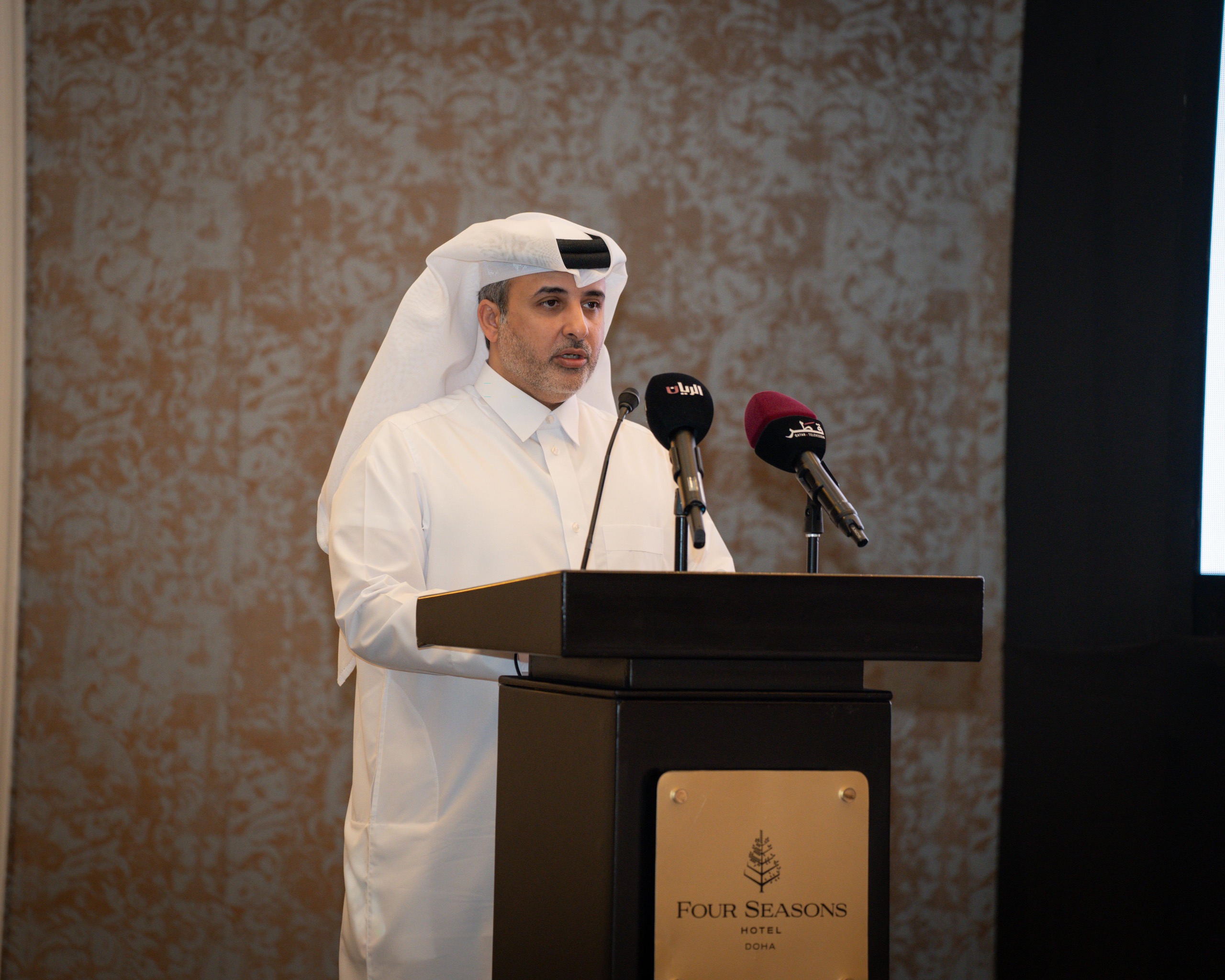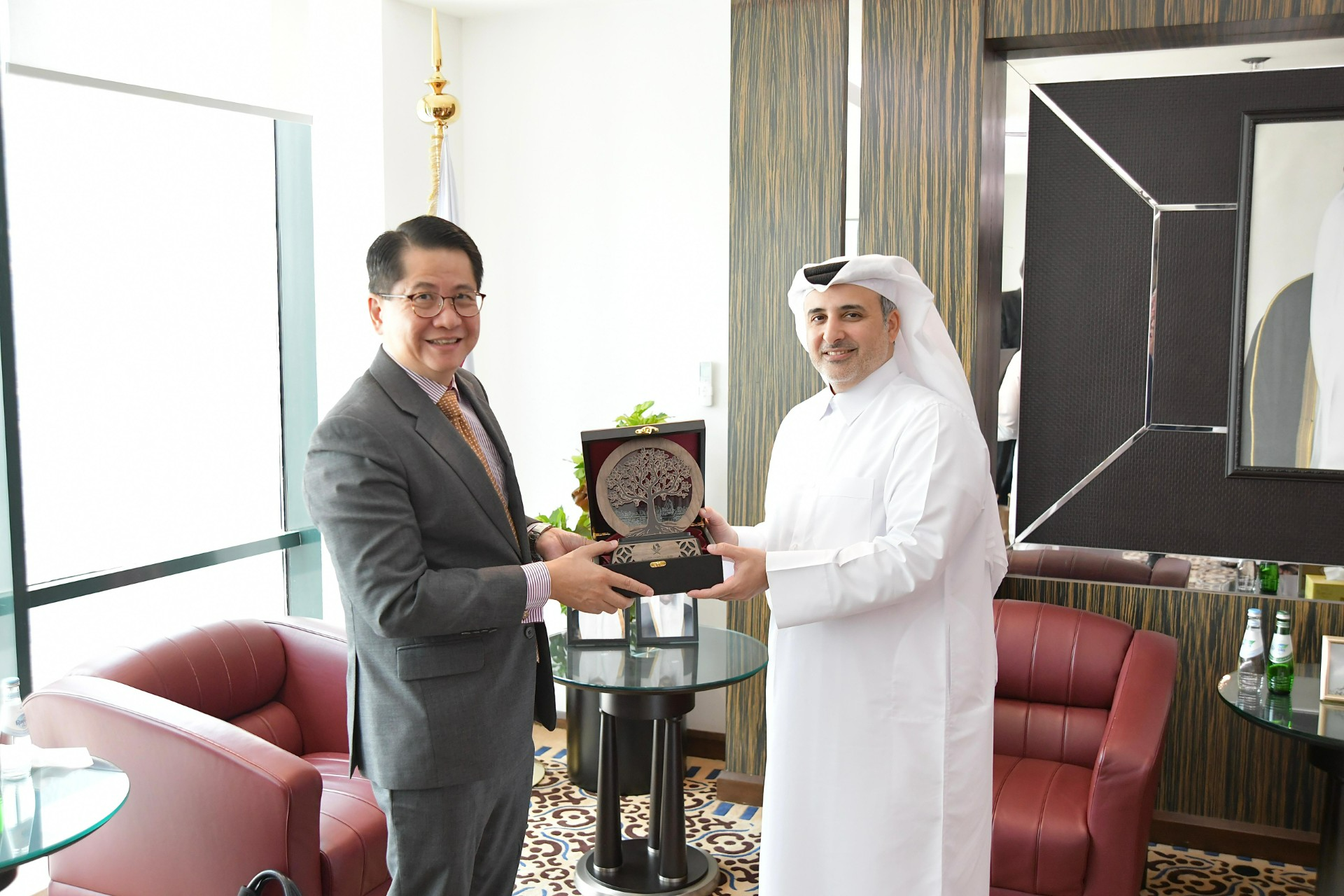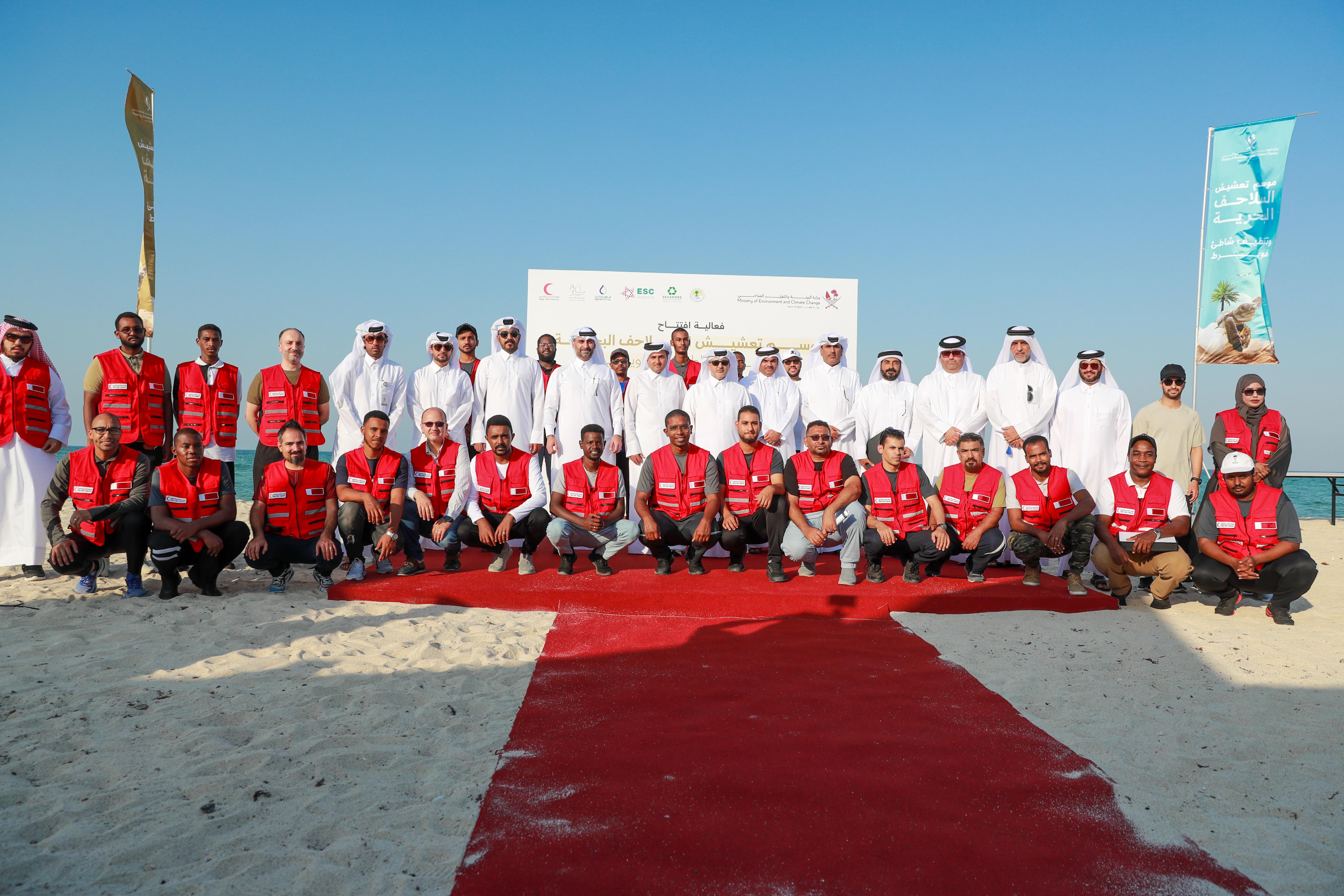
The Ministry of Environment and Climate Change organizes the National Symposium on the Peaceful Uses of Nuclear Energy under the auspices and presence of His Excellency Dr. Abdullah bin Abdulaziz Al-Subaie
Under the auspices and presence of H.E. Dr. Abdullah bin Abdulaziz bin Turki Al-Subaie, Minister of Environment and Climate Change, the Ministry of Environment and Climate Change organized, on Tuesday morning, 16 January 2024, the National Symposium on the Peaceful Uses of Nuclear Energy, which reviewed the success stories of the projects of the technical cooperation program between the State of Qatar and the International Atomic Energy Agency (IAEA) in a number of areas of national development.
The symposium, which was organized by the Department of Radiation Protection, aimed to introduce the public and the local community to the IAEA and the support it provides to the State of Qatar through the technical cooperation program, and to review the success stories of national projects with the IAEA, and the symposium also highlighted the importance of enhancing knowledge of the peaceful uses of nuclear technologies and their role in national development, and the objectives included educating the new generation about the benefits of these technologies in several areas, including radiation safety projects, the environment, health sector projects, agriculture and etc.
The symposium was attended by Dr. Salem bin Nasser Al Nuaimi, President of Doha University of Science and Technology, Mr. Mohammed Ahmed Al Mohannadi, Vice President of the General Authority of Customs, and from the Ministry of Environment and Climate Change Mr. Abdulhadi Nasser Al Marri, Assistant Undersecretary for Environmental Affairs, Mr. Ahmed Al Sada, Assistant Undersecretary for Climate Change Affairs, Dr. Ibrahim Al Muslimani, Assistant Undersecretary for Protection and Natural Reserves, Mrs. Linda Eid – Administrative Officer for Technical Cooperation Programs of the State of Qatar at the IAEA, as well as Dr. Harib Mohammed Al Jabri, Acting Assistant Undersecretary for Higher Education Affairs, Ministry of Education and Higher Education, and a large number of representatives of relevant national institutions.
In his speech at the opening of the symposium, H.E. Minister of Environment and Climate Change Dr. Abdullah bin Abdulaziz bin Turki Al Subaie stressed that the State of Qatar, in light of its National Vision 2030, is participating in 25 technical cooperation projects in cooperation with the International Atomic Energy Agency (IAEA), based on the country’s framework program white paper policy with the IAEA, which addresses key development issues and program priorities in the fields of medicine and human health, food and agriculture, environmental protection, water resources management, human resource development, radiation safety, and nuclear security.
His Excellency explained that Qatar, through technical cooperation projects, has established a Secondary Standards Dosimetry Laboratory to calibrate all types of dosemeters, which is considered the largest of its kind in the region, in order to include all types of different calibrations in order to protect the public and the environment from the hazardous effects of ionizing radiation.
Also, His Excellency pointed to the accreditation by the International Atomic Energy Agency (IAEA) of laboratories in the State of Qatar as accredited international training centers in areas of radiation medicine and food safety, through the memorandum of practical arrangements, pointing to the start of naming Hamad Medical Corporation as an “Anchor Center” to support the IAEA’s initiative “Rays of Hope”, which aims to provide treatment for cancer patients for all, especially developing countries.
During his speech, H.E. the Minister of Environment and Climate Change also noted the Ministry’s participation in the regional project “Contribution to the Global Monitoring of Marine Plastic Pollution”, as part of the IAEA’s initiative “Nuclear Technology to Combat Pollution with Plastics (Nutech Plastics)”, stressing that the State of Qatar will benefit from technical cooperation with the IAEA, through a regional project to support national and regional capacities within the framework of the Integrated Action for Zoonotic Diseases (ZODIAC) initiative.
He pointed out that the technical cooperation projects in the area of radiation safety included the IAEA’s consent to support a national project for the State of Qatar to strengthen regulatory control and implement an effective program for the safe handling of Naturally Occurring Radioactive Material “NORM” waste, a project that will start from January until the end of 2026.
His Excellency additionally commented on the efforts being made in a number of related areas by the Ministry of Environment and Climate Change, such as the Ministry’s release of draft regulatory guidelines for radiation protection in several areas in accordance with recent international standards for safety, with the aim of approving them and allowing users to apply them, pointing out that the Ministry tests more than 300 radiation workers across the country on a regular basis to make sure they meet the requirements and provide scientific and technical data that complies with the international standards of the IAEA. The design of study models, scientific materials, and testing was completed in collaboration with IAEA’s experts.
At the regional and international level, H.E. the Minister of Environment and Climate Change stressed that Qatar is participating in “10” economic and social projects, within the Cooperative Agreement for Arab States in Asia for Research, Development and Training related to Nuclear Science and Technology (ARASIA) projects, which aim to build capacities and training to meet the common priority needs of Arab countries in Asia, and stressed that Qatar implements all the provisions of the agreements concluded with the International Atomic Energy Agency (IAEA), referring in this context to Qatar’s firm support for the IAEA, and calls on it to continue its role in promoting the benefits of peaceful use of nuclear energy .
On the other hand, Mrs. Linda Eid, Administrative Officer of the Technical Cooperation Programs of the State of Qatar at the IAEA, stressed the continuation of cooperation between the IAEA and the State of Qatar to support national priorities and peaceful applications of nuclear technology for sustainable development, noting that the technical cooperation Program is the main channel for the IAEA to provide concrete support to the member states, and help them advance the application of nuclear techniques in many areas and in a safe manner .
During her speech at the symposium, Mrs. Linda Eid, explained that the IAEA’s Technical Cooperation Department works with more than 149 countries, including 35 least developed countries, to support nuclear applications in many areas of development, pointing out that the technical cooperation program between Qatar and the IAEA, which began in 2005, includes 37 projects at the national level, and the new program includes 3 projects directed to support national efforts in medical imaging (PET-MRI), livestock, and radioactive waste management from the oil and gas sector.
She also praised the efforts of the Office of the National Liaison Officer in contacting all project coordinators, enhancing their knowledge and increasing the efficiency of cooperation with the Technical Cooperation Department, which can be seen through the designs for existing projects, in addition to the fact that Qatar has advanced capabilities in the areas of cancer management and food safety, which are the focus areas of the memorandum of practical arrangements signed between Qatar and the IAEA in 2023.
Mrs. Linda Eid, praised Qatar’s success stories in developing medical capabilities at Hamad Medical Corporation, and developing and expanding the National Food Safety Laboratory, noting that this great achievement enables Qatar to provide support to the IAEA’s activities in other countries and countries in the region.
She also noted that the IAEA will continue to support Qatar’s needs through technical cooperation at the national and regional levels, especially since the regional technical cooperation of the ARACIA agreement has contributed to significant progress in nuclear applications and support the medical, agricultural, environmental and industrial sectors.
The Technical Cooperation Officer reviewed the strategic initiatives launched by the IAEA in recent years, which include: “Rays of Hope”, which aims to provide care for cancer patients, the Nuclear Technology Initiative to combat plastic pollution “Nutech Plastics”, which addresses the global challenge of plastic pollution, and the Integrated Action for Zoonotic Diseases Initiative “Zodiac”, in addition to the launch of the “Atoms4Food” and “Atoms for net zero” programs, at the Conference of the Parties COP28 .
- E. Dr. Abdullah bin Abdulaziz bin Turki Al-Subaie, Minister of Environment and Climate Change, honored a number of representatives of relevant local authorities and participated in the symposium, who contributed to enriching it through their discussions and lectures.
In addition to nine lectures given by various local experts, the symposium featured a video presentation on technical cooperation projects in the nation. These lectures covered topics such as the role of nuclear technologies in peaceful applications and national development, the role of the Ministry of Environment in monitoring the implementation of IAEA’s projects in the State of Qatar, and the ways in which national institutions can benefit from IAEA’s project implementation in Qatar.
The symposium also recommended a number of important recommendations, as they were discussed in the discussion session organized within the activities of the symposium, on top of which were the expansion of the peaceful uses of radiation technologies for the purpose of human development and benight, the expansion of knowledge of the peaceful uses of radiation among the public and students, the expansion of the teaching of nuclear science and its uses in schools and universities in order to graduate cadres working in this field, the continuation of coordination with the coordinators of national projects of national authorities and the International Atomic Energy Agency (IAEA) in the implementation of projects and benefit from them at the national level, and the commitment of project coordinators and stakeholders to implement the project plan according to the specified time in order to effectively benefit from the projects.
The symposium also discussed the support provided by the IAEA in the implementation of projects, in the presence of a number of local experts and the official of the IAEA.




